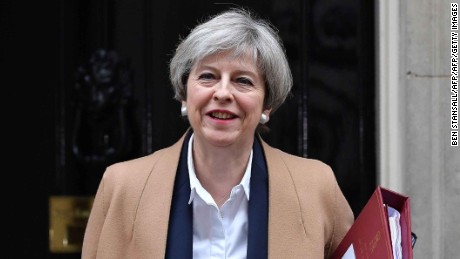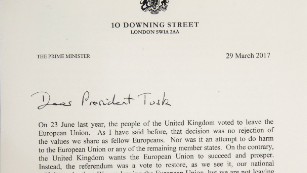Theresa May accused of 'blatant threat' against EU on security
British Prime Minister Theresa May has been accused of threatening to use the safety of UK and European citizens as a bargaining chip in Brexit talks.
In the formal letter that notified the European Union of Britain's intention to leave, May warned that the failure to strike a deal on any future relationship would have consequences for security.
"In security terms a failure to reach agreement would mean our cooperation in the fight against crime and terrorism would be weakened," she wrote in the letter to European Council President Donald Tusk.
In all, May mentioned security 11 times in the six-page letter.
During a BBC interview Wednesday, May said a comprehensive trade agreement and security matters are part of the "raft of negotiations" that will unfold over the next two years, and she'd rather have no deal than a bad deal.
She's not willing to put the UK in the position of "accepting things the voters have said they don't want," she said.
Asked specifically about the prospect of leaving Europol, the EU's law enforcement agency, which co-ordinates the sharing of intelligence on terrorism and organized crime between member states, the premier said the UK would negotiate "security cooperation in a number of crime and justice matters." Especially important, she said, is information on people crossing borders.
"Now is not a time, given the threats we've seen across Europe, for less cooperation," she said.
'Shameful threat'
Tim Farron, leader of the Liberal Democrats, who oppose Brexit, said May's linking of trade and security was "shameful" and a "blatant threat."
Brexit letter: The document that officially triggered Article 50
"Security is too important to be used as a bargaining chip and this will backfire in any negotiations, which rather than building up alliances will leave Britain even more isolated," he said.
Labour MP Yvette Cooper echoed the concerns. "Completely irresponsible to threaten, gamble or bargain on national security," she wrote on Twitter.
Speaking in the Commons, Stephen Kinnock of the opposition Labour Party read out an excerpt from the letter and asked, "Is she really saying the security of our country will be traded like a bargaining chip in these negotiations?"
May replied that it would be important to negotiate a future deal on security.
"We have a relationship with the European Union, there are certain elements of the European Union in justice and home affairs that we're currently members of that in leaving the European Union we would not be members of, and we need to negotiate what the future relationship will be.
"It's very simple, it's very pragmatic and the aim of this will be to ensure cooperation on these matters."
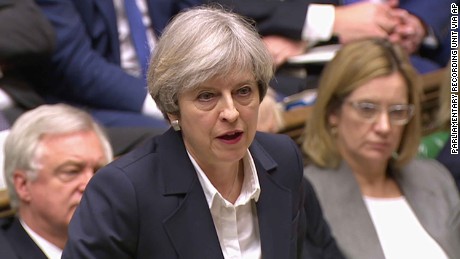
PM Theresa May's full Brexit speech
Britain is arguably the union's strongest defense power, according to the Institute for Government.
"It is one of only two member states possessing 'full-spectrum' military capabilities (including a nuclear deterrent) and one of only five spending 2% of GDP on defense. It also holds a permanent seat on the UN Security Council and has the largest military budget within the EU," the institute said.
A Downing Street spokesman declined to expand on the letter. "The Prime Minister's words speak for themselves. It's a simple fact that if we leave the EU without a deal, the arrangements which we have as part of our EU membership will lapse," he told CNN.
Trade deal sought
The official start to the Brexit process came nine months after the UK voted in a hotly contested referendum that exposed deep divisions across the country.
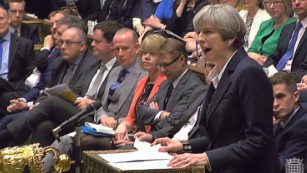
Brexit: What happens after Article 50?
In her letter, May said the UK wanted to pursue a "bold and ambitious" free-trade agreement with the EU in forthcoming talks.
If the country fails to strike a trade deal with Britain and defaults to trading under World Trade Organization rules, it is forecast to lose 7.5% of its GDP over 15 years, according to the UK's own official estimates. May has made clear that the country will not remain in the bloc's single market or customs union, which essentially make the EU a free-trade zone. Staying in the market would likely have forced Britain to keep its borders open to all EU citizens, a key argument by the Leave campaign to exit the union.
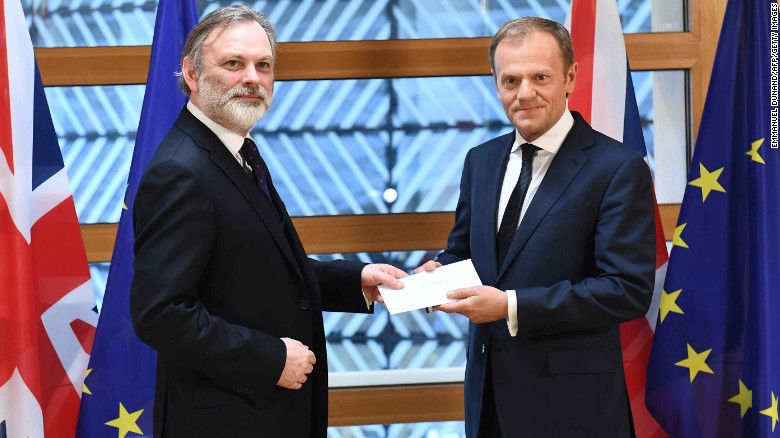
Britain's EU ambassador Tim Barrow delivers the Article 50 letter to European Council President Donald Tusk
In her letter, May tried to strike a conciliatory tone with the EU, reiterating her hopes for Britain and the union to remain the closest of allies and to seek a "deep and special partnership." She also made clear that she wanted to avoid walking away with no deal, and proposed several principles to guide negotiations.
Here are the letter's highlights:
- The UK won't seek membership of the single market, essentially a free-trade zone.
- But it will seek a 'bold and ambitious' free-trade agreement.
- The UK hopes to avoid a cliff-edge separation and ensure certainty for businesses.
- It warns that European security will be under threat if a deal is not reached.
- It expects the devolved regions of Scotland, Wales and Northern Ireland will be granted greater powers.
- The government aims to repeal EU laws and automatically adopt them into UK law for review.
A White Paper on how to do this will be published Thursday.
Tusk: 'We already miss you'
May accepted there would be downsides of Brexit.
"We understand that there will be consequences for the UK of leaving the EU," she told MPs. "We know that we will lose influence over the rules that affect the European economy. We know that UK companies that trade with the EU will have to align with rules agreed by institutions of which we are no longer a part, just as we do in other overseas markets. We accept that."
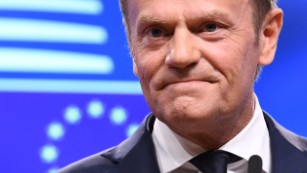
Donald Tusk to UK: 'We already miss you'
After receiving the Article 50 letter, Tusk struck a gloomy note. "There is no reason to pretend that this is a happy day, neither in Brussels nor in London. After all, most Europeans, including almost half the British voters, wished that we would stay together, not drift apart. As for me, I will not pretend that I am happy today," Tusk said.
But he added that Brexit had made the 27 other nations in the EU more determined and united.
"And what can I add to this? We already miss you."
News Courtesy: www.cnn.com

